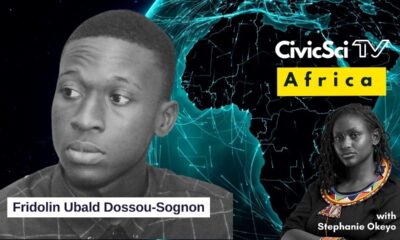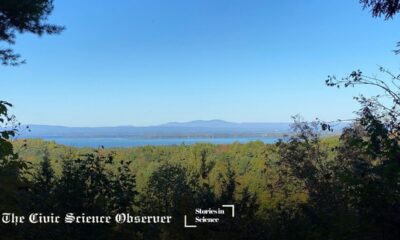Stories in Science Special Series
Finding Clarity in Chaos
Hazal Uzunkaya: “If you asked me what I wanted to be at the age of five, I would say a Veterinarian, which later turned into an Astronaut Veterinarian, and then became Prime Minister Astronaut Veterinarian. I dreamed big, however scattered those dreams were.”

Hazal Uzunkaya
[su_boxbox title=”About”]Hazal is a Research Technology Specialist at Brandeis University where she is in charge of the day to day operations of the Brandeis MakerLab. She specializes in XR and BCI.[/su_boxbox]
[su_boxnote note_color=”#c8c8c8″]Key Points
- Don’t be afraid to break things.
- Be patient. Some journeys start from a scattered position.[/su_boxnote]
[dropcap]I[/dropcap]f you asked me what I wanted to be at the age of five, I would say a Veterinarian, which later turned into an Astronaut Veterinarian, and then became Prime Minister Astronaut Veterinarian. I dreamed big, however scattered those dreams were. Growing up in a house of curious beings, my parents were always doing their best to answer the questions I had about my scattered interests as accurately as possible, and my brother would step in for the types of fringe questions that were too sci-fi for my parents to answer. We brainstormed about humanoid robots or editing our own genes to glow in the dark like a jellyfish.

Hazal Uzunkaya
I loved taking things apart to see how they worked, and more times than I would like to admit, I wouldn’t be able to put them back together. My room had some weird scenes: a skinned toy Furby sitting in the middle of the room, opening and closing its eyes (I’m pretty sure my mom had nightmares after that scene), and broken mirror pieces placed in different parts of the house to see if I could get the laser beam to reach my brothers room. Later these experiments turned into, “I can fix this.” My parents never yelled at me for trying to fix things but ended up causing more damage or breaking it.
They were proud and supportive of my curious efforts. At boarding school in Switzerland, I wasn’t allowed to take things apart as freely as I did at home. Instead, I found joy in fetal pig dissections and other experiments. During junior year of high school, I was thrilled when my computer charger broke right before going back home. The first day back, I woke up and told my dad to take me to a store where I could buy spare parts. He said he needed to go to work, but we could work on it when he got back. By noon that day, I couldn’t wait any longer so I gave him a call. He told me to go to his study and gather the tools needed.
In college, my interests were as scattered as they had been my whole life.
I found all the tools he told me to find, the soldering iron didn’t have a power cable which was strange, I had never seen that before but if my dad said it is a soldering iron, who was I to argue? I gave him another call, he said that it didn’t have a wire because it used butane to heat up the tip. He gave me instructions on what to do; first I needed to carefully open the box that holds the electronic parts. Once I got that part done, I gave him another call to make sure I wasn’t doing anything wrong, but he didn’t pick up.
I waited for a while for him to call me back. Probably only a couple of minutes passed but it felt like an eternity. So, I decided to work it out by myself. I knew there was a positive and negative connection. I ended up doing an alright job soldering. Now it was time to close up the box. However, there was one minor problem. The box wouldn’t close back up. I must’ve broken some pins while opening it, so I used a mixture of super glue and hot glue gun close it up, and plugged it in. It worked! It wasn’t the best-looking charger out there, but it worked nonetheless!
In college, my interests were as scattered as they had been my whole life. I started freshman year as a pre-med track. After a semester, I got fascinated by physics and switched. When junior year arrived, I realized I missed the biological sciences. So, I decided to try out a class in neuroscience. The first assignment was to read a section of Dr. Eric Kandel’s book that focused on memory. I ended up reading way past the assigned chapter. And just like that, I was in love with neuroscience. I called my mom to tell her that I decided I was going to study physics and neuroscience. She told me that it was too much and that I should focus on one subject. But I had fallen in love and made up my mind. I spent the next few years trying to catch up and finish the physics and neuroscience majors on time.
Thanks to my dad’s controlled neglect in my projects, I had a life time of experience of figuring things out on my own.
Science needs organization, and I had started my journey in a complete chaos. I didn’t have time to work and study. This meant I had less work experience than my peers. Even if I did have time, which lab would combine physics, electronics and neuroscience? While looking for any on-campus job postings that included the word “research” in it, I saw a posting called “Research Technologist.” A research technologist worked to troubleshoot and repair the technology used in research. It was exactly what I wanted to do! I would go into labs where I vaguely knew how a piece of specialized research equipment worked and had to figure out how to repair it myself.
Thanks to my dad’s controlled neglect in my projects, I had a life time of experience of figuring things out on my own. Later that semester, our team founded the MakerLab. Now, five years later, I am a “Research Technology Specialist.” I synthesize easily consumable workflows from complex technical workflows thus making it easier for researchers to grasp. I meet with researchers, identify their roadblocks and design technology for them to tackle those roadblocks. My latest invention? A “Cricket Dispenser” which randomly dispenses crickets to mice in experiments that use live food reward! My scattered interests allow me to use my creativity to overcome problems that researchers face and I encourage other tinkerers and dreamers to try turning their ideas into reality through the micro-grant program I built.
[su_boxnote note_color=”#c8c8c8″]Hope you are enjoying reading the stories! It’s a little awkward to ask, but if you can, please consider supporting our efforts to keep the journal alive – it only takes a minute to donate. Thank you![/su_boxnote]
Metrics
Sessions
Total number of Sessions. A session is the period time a user is actively engaged with the page.
Visitors
Users that have had at least one session within the selected date range. Includes both new and returning users.
Page views
Pageviews is the total number of time the article was viewed. Repeated views are counted.
The CS Media Lab is a Boston-anchored civic science news collective with local, national and global coverage on TV, digital print, and radio through CivicSciTV, CivicSciTimes, and CivicSciRadio. Programs include Questions of the Day, Changemakers, QuickTake, Consider This Next, Stories in Science, Sai Resident Collective and more.

-
Audio Studio1 month ago
“Reading it opened up a whole new world.” Kim Steele on building her company ‘Documentaries Don’t Work’
-
 Civic Science Observer1 week ago
Civic Science Observer1 week ago‘Science policy’ Google searches spiked in 2025. What does that mean?
-
Civic Science Observer1 month ago
Our developing civic science photojournalism experiment: Photos from 2025
-
Civic Science Observer1 month ago
Together again: Day 1 of the 2025 ASTC conference in black and white
Contact
Menu
Designed with WordPress
























